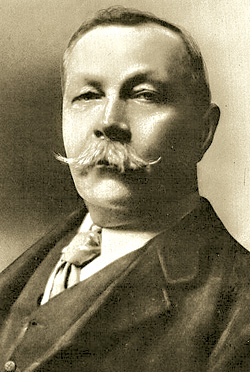Dead some six decades, the creator of Sherlock Holmes still ranks as one of the most read and influential authors of our time. In part, that’s because his detective mysteries, filled with relentless reasoning, forensic technique, and evil archvillains, serve as the template for our countless serial-killer books and films, and for all those police procedural TV shows like CSI. But you can’t just label Conan Doyle (1859–1930) a mere crime writer. Without his sci-fi adventure The Lost World, there’d likely be no Jurassic Park, or even King Kong. A champion of logic, trained as a physician, he spans the transition from late Victorian times to modernity. He’s a rationalist-sentimentalist who can’t quite settle into either camp.
Perhaps for that reason, Julian Barnes incorporates the conflicted Conan Doyle into his new novel, Arthur & George (Knopf, $24.95), which is set in 1906 England. Here Conan Doyle is in raging midlife crisis: rich, famous, knighted by King Edward VII, recently widowed yet emotionally unready to marry the younger woman he loves. Then he reads of the case of young lawyer George Edalji, convicted in 1903 for “the Great Wyrley Outrages.” These consisted of bizarre animal mutilations and malicious prank letters surrounding the vicarage of Great Wyrley (where Edalji’s father was parish priest). Conan Doyle is certain that the meek, half-blind solicitor is innocent, and he sets out to clear his name. Maybe then he can beat his looming literary creation at the detective game—and perhaps bury him in the process. He wonders, Barnes writes, “if he would ever cease to be punished for having invented Sherlock Holmes.” George Edalji gives Conan Doyle that chance, and he seizes it.
The Edalji affair divides Conan Doyle’s life, and there are other doublings at work. Though he’d long ceased to love his tuberculosis-ridden first wife, he was apparently too upright to keep Jean Leckie as a mistress. Not even as a widower would he consummate their passionate, platonic relationship. There are two moral codes at work: Conan Doyle feels he must observe strict Edwardian propriety; then, as Edward VIII would later demonstrate, sometimes you’ve got to chuck propriety out the window. In Barnes’ novel, besides the imprisoned Edalji, he’s also trying to free himself.
Julian Barnes reads on Thurs., Feb. 9, at Elliott Bay Book Co., 101 S. Main St., 206-624-6600, www.elliottbaybook.com.








